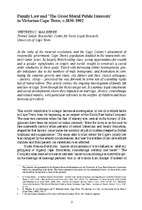Family law and "the great moral public interests" in Victorian Cape Town

View/
Date
2010Author
Malherbe, Vertrees C.(University of Cape Town)
Metadata
Show full item recordAbstract
In the wake of the mineral revolution, and the Cape Colony’s attainment of
responsible government, Cape Town’s population doubled in the nineteenth century’s
latter years. Its largely British ruling class, seeing opportunities for wealth
and a greater significance in empire and world, sought to construct a social
order conducive to those goals. Faced with increasing ethnic heterogeneity, gender
imbalance due to the numbers of male immigrants, and frustration in combating
the endemic poverty and slums, city fathers and their closest colleagues
– doctors, clergy – perceived the way forward in terms not of extending rights
but of moral reform. This article carries the ongoing investigation of family life
and law in Cape Town through the Victorian period. It examines legal enactments
and social developments where they impacted on marriage, divorce, concubinage
and related matters, with particular reference to the welfare of children and those
born out of wedlock.
